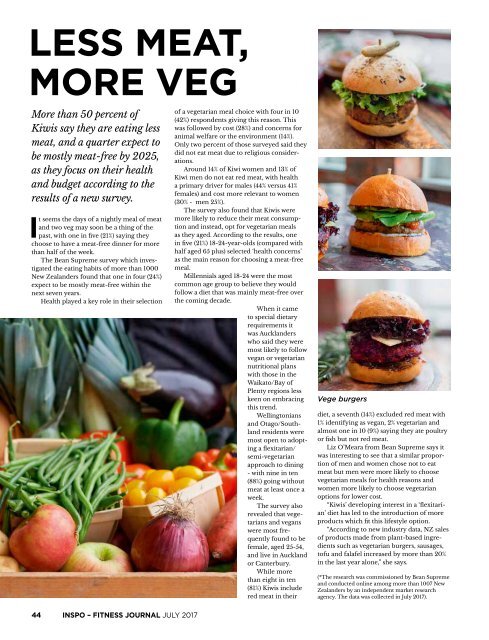INSPO Fitness Journal July 2017
Everything from nutrition, beauty, home and workplace wellbeing to health, performance – and so much more.
Everything from nutrition, beauty, home and workplace wellbeing to health, performance – and so much more.
You also want an ePaper? Increase the reach of your titles
YUMPU automatically turns print PDFs into web optimized ePapers that Google loves.
LESS MEAT,<br />
MORE VEG<br />
More than 50 percent of<br />
Kiwis say they are eating less<br />
meat, and a quarter expect to<br />
be mostly meat-free by 2025,<br />
as they focus on their health<br />
and budget according to the<br />
results of a new survey.<br />
It seems the days of a nightly meal of meat<br />
and two veg may soon be a thing of the<br />
past, with one in five (21%) saying they<br />
choose to have a meat-free dinner for more<br />
than half of the week.<br />
The Bean Supreme survey which investigated<br />
the eating habits of more than 1000<br />
New Zealanders found that one in four (24%)<br />
expect to be mostly meat-free within the<br />
next seven years.<br />
Health played a key role in their selection<br />
of a vegetarian meal choice with four in 10<br />
(42%) respondents giving this reason. This<br />
was followed by cost (28%) and concerns for<br />
animal welfare or the environment (14%).<br />
Only two percent of those surveyed said they<br />
did not eat meat due to religious considerations.<br />
Around 14% of Kiwi women and 13% of<br />
Kiwi men do not eat red meat, with health<br />
a primary driver for males (44% versus 41%<br />
females) and cost more relevant to women<br />
(30% - men 25%).<br />
The survey also found that Kiwis were<br />
more likely to reduce their meat consumption<br />
and instead, opt for vegetarian meals<br />
as they aged. According to the results, one<br />
in five (21%) 18-24-year-olds (compared with<br />
half aged 65 plus) selected ‘health concerns’<br />
as the main reason for choosing a meat-free<br />
meal.<br />
Millennials aged 18-24 were the most<br />
common age group to believe they would<br />
follow a diet that was mainly meat-free over<br />
the coming decade.<br />
When it came<br />
to special dietary<br />
requirements it<br />
was Aucklanders<br />
who said they were<br />
most likely to follow<br />
vegan or vegetarian<br />
nutritional plans<br />
with those in the<br />
Waikato/Bay of<br />
Plenty regions less<br />
keen on embracing<br />
this trend.<br />
Wellingtonians<br />
and Otago/Southland<br />
residents were<br />
most open to adopting<br />
a flexitarian/<br />
semi-vegetarian<br />
approach to dining<br />
- with nine in ten<br />
(88%) going without<br />
meat at least once a<br />
week.<br />
The survey also<br />
revealed that vegetarians<br />
and vegans<br />
were most frequently<br />
found to be<br />
female, aged 25-54,<br />
and live in Auckland<br />
or Canterbury.<br />
While more<br />
than eight in ten<br />
(81%) Kiwis include<br />
red meat in their<br />
Vege burgers<br />
diet, a seventh (14%) excluded red meat with<br />
1% identifying as vegan, 2% vegetarian and<br />
almost one in 10 (9%) saying they ate poultry<br />
or fish but not red meat.<br />
Liz O’Meara from Bean Supreme says it<br />
was interesting to see that a similar proportion<br />
of men and women chose not to eat<br />
meat but men were more likely to choose<br />
vegetarian meals for health reasons and<br />
women more likely to choose vegetarian<br />
options for lower cost.<br />
“Kiwis’ developing interest in a ‘flexitarian’<br />
diet has led to the introduction of more<br />
products which fit this lifestyle option.<br />
“According to new industry data, NZ sales<br />
of products made from plant-based ingredients<br />
such as vegetarian burgers, sausages,<br />
tofu and falafel increased by more than 20%<br />
in the last year alone,” she says.<br />
(*The research was commissioned by Bean Supreme<br />
and conducted online among more than 1007 New<br />
Zealanders by an independent market research<br />
agency. The data was collected in <strong>July</strong> <strong>2017</strong>).<br />
44 <strong>INSPO</strong> – FITNESS JOURNAL JULY <strong>2017</strong>


















